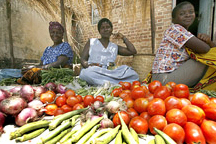
Typical street scene in Santa Ana, El Salvador. (Photo: iStock)
IMF Survey: Coping With Food Price Increases in Sub-Saharan Africa
March 20, 2008
- Mix of temporary and longer-term factors driving up prices
- Social implications of rising food prices can be severe
- Effect of temporary shocks could be mitigated by temporary and targeted subsidies
Inflationary pressures have been rising in Sub-Saharan Africa, as elsewhere in the world, due to higher prices for fuel and other commodities, especially food.

Selling vegetables in Malawi: rising food prices have caused problems in several African countries. (photo: Frank May/ DPA)
Impact on poor
These pressures pose new challenges for African policymakers and will have particularly adverse effects on the poor.
The increase in food prices reflects a mixture of temporary and longer-term factors.
Longer-term structural price increases are at play: rising biofuels production in the United States and European Union accounts for almost half of the increase in consumption of major food crops in the past year. Growth in per capita income in emerging economies has brought robust demand growth. Higher energy and fertilizer costs have also contributed to higher prices for all agricultural commodities. Most of these factors are likely to be permanent.
Temporary factors have also affected supply. Droughts, especially in countries south of the equator, reduced wheat production in 2007. And post-election violence in Kenya has led to shortages and price hikes in neighboring countries as well as Kenya.
Significant impact
Fuel and food-price shocks have a significant impact on the population of low-income countries. Because food represents a larger share of what poorer consumers buy, a global increase in food prices has a bigger impact on inflation in poorer countries. The same is true for fuel, which has also become much more expensive.
The net effect of higher food and fuel prices on the terms of trade varies across countries but has been positive in about half the countries of sub-Saharan Africa—particularly those that export commodities. Within countries the impact varies by economic group; for example, farmers producing export crops may gain though urban consumers of imported food and oil have been hurt.
The social implications of rising food prices can be severe. Some countries have recently had food price-related riots. In Burkina Faso, there have been demonstrations in two cities. In Cameroon, political unrest spilled over into protests over food and fuel prices. Niger has also suffered food-price-related riots.
Food prices rising faster
In sub-Saharan Africa on average, food inflation is currently 2.8 percentage points higher than headline inflation, and the latest increases in food prices are not yet reflected in CPI data.
But rising food and fuel prices will not translate into higher sustained inflation if the policy response is correct. Monetary policy is responding appropriately in most countries in the region, and overall inflation remains contained by historical standards.
The spike in the prices of fuel and individual food commodities, however, calls for policy responses that must be custom-tailored to each country's unique situation and whether the shock is temporary or permanent.
Guiding policy responses
Certain principles can help guide policy responses:
• If the country can, it should seize the opportunity—and several countries are doing so—to encourage expansion of domestic agricultural production. This can be done effectively not by direct financing of production but by improving infrastructure and distribution and storage systems, increasing competition, removing policy distortions that discourage food production, and removing barriers to trade. However, countries should avoid distortionary policies such as untargeted subsidies.
• Temporary increases in food prices need not call for countervailing monetary policy, particularly if monetary policy is already accepted as credible. However, there may be a need for tighter policies if sustained high food price inflation starts to have significant second-round effects.
• The effect of temporary shocks could be mitigated by temporary and targeted subsidies, temporary tax measures, or increased reliance on international aid, all of which can help protect the most vulnerable.
Comments on this article should be sent to imfsurvey@imf.org


